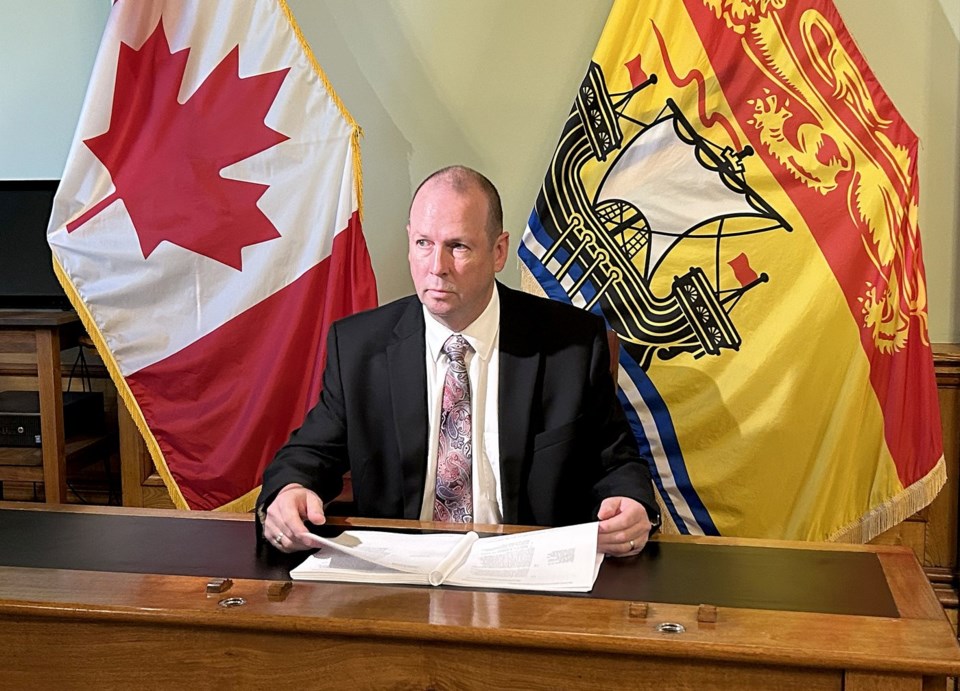FREDERICTON — New Brunswick's reliance on private nursing services was not a good use of public money, the province's auditor general said Tuesday, noting that the two provincial health authorities and a government department failed to properly monitor who was getting paid and how much.
In his latest audit, Paul Martin studied almost $174 million worth of contracts with private companies that offer travel nurses — who work on temporary assignments across the health network — between Jan. 1, 2022, and Feb. 29, 2024.
His report is an indictment on government management: little to no criteria for choosing travel nurse companies; no legal review of contracts, some of which were tendered without requests for proposals; payments made without due diligence or documentation to justify expenses.
"It's probably the greatest surprise I've seen in a lot of my years," Martin told reporters after he released his report.
"The facts are striking to me. I'm shocked, disappointed ... Action needs to happen. This can't continue. This is not the appropriate way to do contract management, procure for government, deliver services. This has to be fixed."
Out of the three government bodies audited, the biggest spender on travel nurses was the francophone Vitalité Health Network, which paid more than $123 million, including $98 million to one Ontario-based agency, Canadian Health Labs. Martin said Vitalité conducted three internal audits on its contracts with the Ontario agency but refused to give his office access to them.
"Due to the lack of co-operation from Vitalité, risks that they identified in the audit reports and to what extent those risks were addressed is not known," his report said.
The francophone health network did not have guidelines or other selection criteria to support its choice of private nursing vendors, Martin said in the report, adding that the health authority "did not obtain a legal review for any of the contracts they signed."
Contracts — one of which had an automatic renewal clause — tendered by Vitalité were not aligned with government standards, the audit found. In some cases payments were made without due diligence and without sufficient supporting documentation, including for rental cars and meal allowances.
"In our testing of 64 invoices, we noted meal allowances on CHL (Canadian Health Labs) invoices were paid without adequate support totalling $281,640. Meal allowances were often paid for double or triple what the support provided would have allowed for."
In a statement on its website Vitalité said it submitted all but three documents requested by Martin's office. The three documents that were not transferred, it said, were shielded by a non-disclosure agreement.
"We clearly explained this constraint as (we are) in the midst of a dispute with one of the companies targeted in this investigation," it said.
Canadian Health Labs chief executive officer Bill Hennessey was not available on Tuesday for an interview.
Meanwhile, $3 million in spending on travel nurses at the Department of Social Development was made without requests for proposals, and Martin found that pricing structures varied significantly. Of the two companies hired — Canadian Health Labs and Plan A — Canadian Health Labs billed 3.6 times more for an eight-hour day than Plan A.
"Pricing structures and the service delivery model varied greatly between the contracts and there was no comparative analysis done to support the strategic use of one company over another," it said.
Horizon Health Network's travel nurse spending — $48 million — also lacked due diligence, the report said.
"We reviewed 200 travel expenses claimed and found only 122 (61 per cent) had any level of backup to support the payment," Martin said, adding that in the cases where support was provided, "it was often inadequate."
Premier Blaine Higgs told the legislature Tuesday he was "disappointed" by Martin's report.
"I do take responsibility because it's not acceptable."
Social Development Minister Jill Green said the government is working "very closely" with the offices of the attorney general and auditor general to review next steps.
"I can tell you that we've worked professionally with the service providers out there," Green said. "We entered into contracts with them. We signed the contracts. Now we're looking (at) how to remove ourselves from those contracts."
Green party member Megan Mitton called the contracts "a clear mismanagement of public funds."
"Canadian Health Labs must be laughing all the way to the bank. They have had quite a lucrative time in New Brunswick so far," she said.
In his report, Martin offers a series of recommendations, including that the Department of Social Development produce a clear process to award public contracts. He said Horizon Health should ensure that billed rates are in compliance with contracted terms. And for Vitalité, the auditor said, the francophone agency should ensure that "significant contracts of a predetermined dollar value be reviewed by legal counsel."
"There's some common sense missing here that went out the window," Martin told reporters. "People were just pressing click on the pay button and not doing their due diligence, not following policy. This is not how bills are supposed to be paid without the proper support."
This report by The Canadian Press was first published June 4, 2024.
Hina Alam, The Canadian Press



